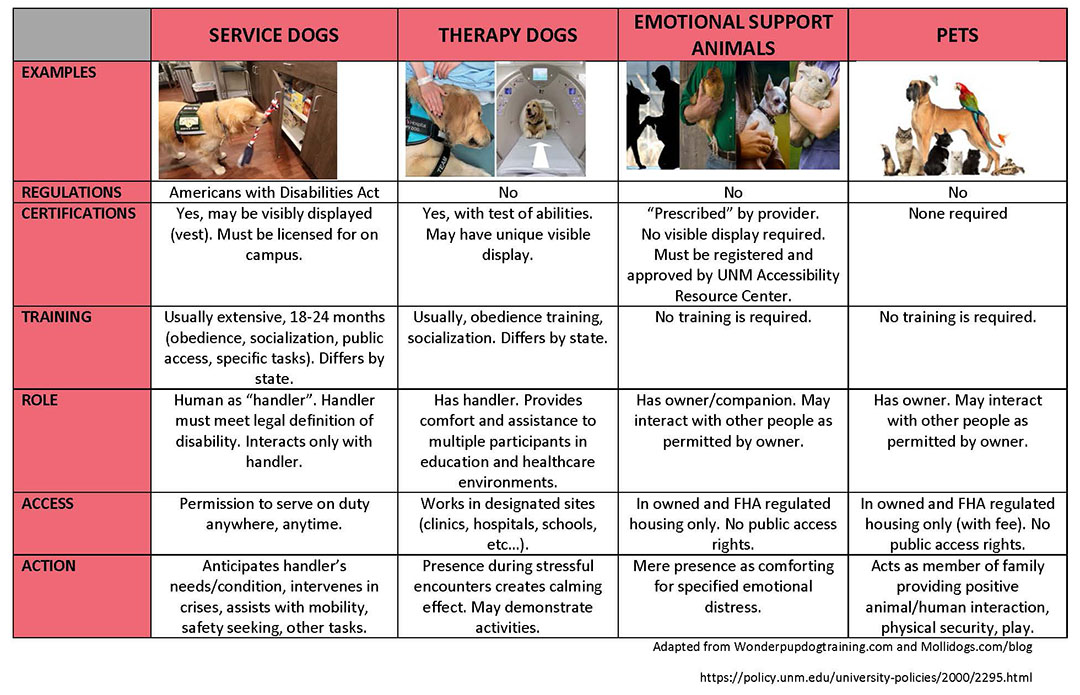Animals
Service Animals * -- Student Health and Counseling complies with all ADA requirements and accepts service animals in the clinic as defined in the ADA 2010.
Emotional Support Animals ** -- Student Health and Counseling does not permit Emotional Support Animals (ESAs)** on site. Emotional Support Animals, sometimes used as part of a treatment plan as therapy animals, are not considered service animals under the ADA. For more information, see "A Message From the Director" below.
* Types of Service Dogs may include, but are not limited to:
- Guide Dog
- Mobility Aid Dog
- Seizure Alert Dog
- PTSD Dog
- Hearing Alert Dog
- Diabetes Alert Dog
- Migraine Alert Dog
- Narcolepsy Alert Dog
- Seizure Response Dog
- Psychiatric Service Dog
**Types of Emotional Support Animals may include, but aren't limited to:
- Companionship animals
- Animals to relieve loneliness
- Animals to help with depression
- Animals to help with anxiety
- Animals to help with certain phobias
Animal Differences Chart
Chart Sources:
A Message from the Director
In recent years the idea of Emotional Support Animals (ESAs) or Assistance Animals has become very popular. Health services all over the country have received numerous requests from students to write letters stating that they have a mental health or medical condition that would benefit from the presence of an animal. Most often these requests are made by students who report some kind of emotional distress or difficulty adjusting to the environment and would like to be able to have an animal to comfort them in a residence hall or an apartment that typically would not accept pets. It is understandable to want an adorable, fluffy, warm and cuddly creature who is always thrilled to have us around. There is even some research evidence that petting dogs can decrease nervous system arousal, increase serotonin, epinephrine and oxytocin (all feel-good neurochemicals).
But we at SHAC do not prescribe ESAs and we will not issue letters stating that a student needs one. In addition, we do not permit ESAs in the SHAC building in order to protect those with animal allergies or other students who do not respond well to the presence of animals, and to prevent disruptions and distractions in our health care setting and during appointments and treatment procedures. Here are other reasons why we maintain this stance on ESAs:
- ESAs are not Service Animals under the Americans with Disabilities Act (ADA) because they are not trained to perform a specific duty to compensate for a disability. If a student does meet the criteria for a disability (which could only be determined after a thorough assessment) then a variety of accommodations may be considered, typically in collaboration with the Accessibility Resource Center (ARC) on campus. It is important to note that misrepresenting an ESA as a Service Animal is a violation of the law.
- The benefit of ESAs is their mere presence. Most of us who have pets can also attest to the same warm and wonderful feelings created when we are interacting with our pets, too. Except for a smaller subset of human beings, most people experience positive benefits from interactions with cuddly animals. This positive effect does not mean that a diagnosable condition has been identified or treated or that providers will now prescribe it. There are many things that may produce similar positive effects in human beings (exercise, music, etc.). We may even recommend those things to you as a part of a healthy lifestyle, but we do not prescribe them, and will not write letters advocating that you have them everywhere.
Please let us know at SHAC if you are experiencing distressing emotional and physical symptoms or if you are having difficulty adjusting to this environment. We are available to assess and treat you using the knowledge, skills, and tools we were trained to use. We truly understand the love and connection we can have with animals, how they benefit us, and many students desires to have one. We simply do not prescribe them.

